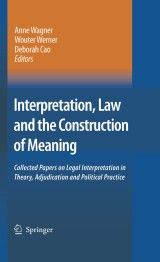Details

Interpretation, Law and the Construction of Meaning
Collected Papers on Legal Interpretation in Theory, Adjudication and Political Practice|
96,29 € |
|
| Verlag: | Springer |
| Format: | |
| Veröffentl.: | 16.05.2007 |
| ISBN/EAN: | 9781402053207 |
| Sprache: | englisch |
| Anzahl Seiten: | 219 |
Dieses eBook enthält ein Wasserzeichen.
Beschreibungen
<P>Legal semiotics emphasizes the contingency and fluidity of legal concepts and stresses the existence of overlapping, competing and coexisting legal discourses. In response to new problems, changing power structures, changing societal norms and new faces of injustice established doctrines are reconsidered, reformulated and partly replaced by competing doctrines and hypotheses. Given the relative indeterminacy of law, it is no surprise that the problem of interpretation has always been one of the focal points of attention for legal semiotics. Who has the power to define words and concepts? Who can successfully assume the power to speak on behalf of the legal community? Which methods are used to justify the power to define?</P>
<P></P>
<P>This book discusses the questions mentioned above from three, related perspectives:</P>
<P>-Legal theory (Part I). <BR>-Judicial reasoning (Part II). <BR>-Application of law in politics and diplomatic practice (Part III). </P>
<P></P>
<P>This book discusses the questions mentioned above from three, related perspectives:</P>
<P>-Legal theory (Part I). <BR>-Judicial reasoning (Part II). <BR>-Application of law in politics and diplomatic practice (Part III). </P>
Legal Theory.- Law as Fact, Law as Fiction.- Lexical Indeterminacy.- Topical Jurisprudence.- Legal Speech Acts as Intersubjective Communicative Action.- Judicial Reasoning.- Who needs Fact when you’ve got Narrative? The Case of P,C&S vs. United Kingdom.- Taking Facts Seriously.- Transforming Ambiguity into Vagueness in Legal Interpretation.- Application of Law in Political Practice.- The Inclusive/Exclusive Nation.- Global Values and Floating Borders in the Brazilian Amazon.- Landmarks for Aboriginal Law in Australia.
<P>Legal semiotics emphasizes the contingency and fluidity of legal concepts and stresses the existence of overlapping, competing and coexisting legal discourses. In response to new problems, changing power structures, changing societal norms and new faces of injustice established doctrines are reconsidered, reformulated and partly replaced by competing doctrines and hypotheses. Given the relative indeterminacy of law, it is no surprise that the problem of interpretation has always been one of the focal points of attention for legal semiotics. Who has the power to define words and concepts? Who can successfully assume the power to speak on behalf of the legal community? Which methods are used to justify the power to define?</P>
<P></P>
<P>This book discusses the questions mentioned above from three, related perspectives:</P>
<OL>
<P></P></OL>
<UL>
<LI>Legal theory (Part I). This part discusses how more traditional approaches have dealt with the problem of legal interpretation and indeterminacy, questions the methods applied in traditional legal theory and offers new theoretical tools to understand the problem of legal interpretation.</LI></UL>
<OL>
<P></P>
<P></P></OL>
<UL>
<LI>Judicial reasoning (Part II). The insights discussed in Part I are refined using legal semiotics, speech act theory and rhetorics and applied to the legal reasoning of courts and tribunals either in common law and civil law traditions.</LI></UL>
<OL>
<P></P>
<P></P></OL>
<UL>
<LI>Application of law in politics and diplomatic practice (Part III). Traditionally, the study of legal reasoning has focussed on the application of law by courts and tribunals. However, legal reasoning also takes place outside the courtroom and takes up in the political and diplomatic arena. Who is included and excluded by particular conceptions of law? How does law deal with the phenomenon of interculturality?</LI></UL>
<P><EM>"Combining theoretical inspiration with a keen interest in case law, this volume will appeal to scholars and students of legal theory, jurisprudence, legal anthropology, postcolonial studies, indeed to anyone who’s interested in problems of interpretation in legal and political theory and practice. It should also come in very handy in the classroom."<BR></EM>Ronnie Lippens, Professor of Criminology, Keele University.</P>
<P></P>
<P>This book discusses the questions mentioned above from three, related perspectives:</P>
<OL>
<P></P></OL>
<UL>
<LI>Legal theory (Part I). This part discusses how more traditional approaches have dealt with the problem of legal interpretation and indeterminacy, questions the methods applied in traditional legal theory and offers new theoretical tools to understand the problem of legal interpretation.</LI></UL>
<OL>
<P></P>
<P></P></OL>
<UL>
<LI>Judicial reasoning (Part II). The insights discussed in Part I are refined using legal semiotics, speech act theory and rhetorics and applied to the legal reasoning of courts and tribunals either in common law and civil law traditions.</LI></UL>
<OL>
<P></P>
<P></P></OL>
<UL>
<LI>Application of law in politics and diplomatic practice (Part III). Traditionally, the study of legal reasoning has focussed on the application of law by courts and tribunals. However, legal reasoning also takes place outside the courtroom and takes up in the political and diplomatic arena. Who is included and excluded by particular conceptions of law? How does law deal with the phenomenon of interculturality?</LI></UL>
<P><EM>"Combining theoretical inspiration with a keen interest in case law, this volume will appeal to scholars and students of legal theory, jurisprudence, legal anthropology, postcolonial studies, indeed to anyone who’s interested in problems of interpretation in legal and political theory and practice. It should also come in very handy in the classroom."<BR></EM>Ronnie Lippens, Professor of Criminology, Keele University.</P>
Challenges traditional approaches to legal interpretation Combines insights from analytical legal theory with legal semiotics Focuses on the application of law in a wide variety of contexts, including international politics and diplomatic practice

















